Book contents
- Frontmatter
- Contents
- List of abbreviations
- Preface
- Acknowledgements
- List of figures
- List of texts
- 1 Introduction
- 2 Regional and social varieties
- 3 Spelling and pronunciation
- 4 Inflection
- 5 Syntax
- 6 Lexis
- 7 Text types and style
- 8 Provisional conclusions
- 9 Texts
- 10 Information on texts and authors
- References
- Index of names
- Index of topics and titles
- Index of selected words and pronunciations
2 - Regional and social varieties
Published online by Cambridge University Press: 17 May 2010
- Frontmatter
- Contents
- List of abbreviations
- Preface
- Acknowledgements
- List of figures
- List of texts
- 1 Introduction
- 2 Regional and social varieties
- 3 Spelling and pronunciation
- 4 Inflection
- 5 Syntax
- 6 Lexis
- 7 Text types and style
- 8 Provisional conclusions
- 9 Texts
- 10 Information on texts and authors
- References
- Index of names
- Index of topics and titles
- Index of selected words and pronunciations
Summary
Attitudes
In spite of the documentation quoted above, there is an insufficiency of reliable data on what people thought about linguistic correctness and prestige (and how such opinions related to the same persons’ actual usage); anecdotal evidence comes from private letters and similar documents, such as those quoted in Honey (1988, 1989), and from the prescriptive statements in grammar books and advice in books on etiquette. Attitudes can also be reconstructed from novels and plays, although these data need to be interpreted with particular caution. The authors’ main objective, then as now, is unlikely to be the provision of a realistic account; rather, they tend to employ selected sociolinguistic features to characterize their protagonists in conversation or to make them comment on others’ speech forms. Therefore, the title of Phillipps (1984) is somewhat misleading, since the book does not really treat ‘Language and class in Victorian England’, but deals with how writers of fiction described the situation, with particular focus on the 19th-century upper classes. Anyone using such literary evidence as a data base is in the position of a social historian writing on poverty, work relations and dependency in early Victorian society on the basis of Hard Times. Phillipps supplements his evidence from linguistic advice provided in books on etiquette, but largely reduces this to the very questionable contrast between ‘U’ and ‘non-U’. Admittedly, this binary contrast may reflect much of the 19th-century upper-middle-class attitude towards correctness and good breeding, which is also mirrored in books like W. H. Savage's The Vulgarisms and Improprieties of the English Language (1833, T6).
- Type
- Chapter
- Information
- English in Nineteenth-Century EnglandAn Introduction, pp. 26 - 43Publisher: Cambridge University PressPrint publication year: 1999



